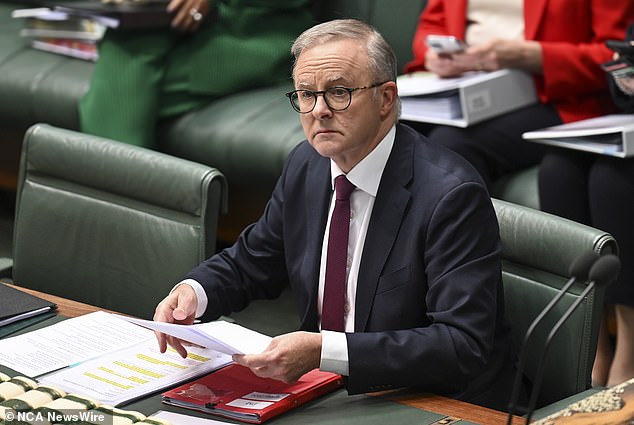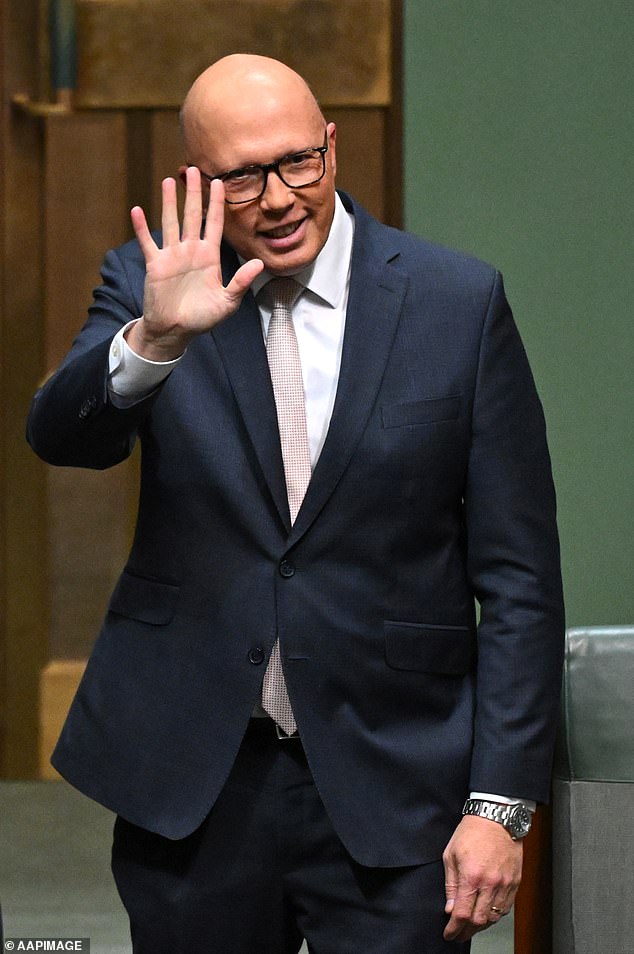Labor’s ‘surplus’ Budget is just smoke and mirrors – and Aussies should be worried… PETER VAN ONSELEN reveals the damning details that prove Australia is on the road to financial ruin
This year’s budget highlighted how fiscally doomed we are as a nation, even as the government tried to hide this fact in plain sight.
And in doing so, they have used a mix of trickery and deceit.
Before we even got to Budget Day itself, ‘the surplus’ was strategically leaked to the media: it amounted to $9.3 billion and surprised most observers on the positive side. A product of favorable trading conditions.
Sounds good, right? Wrong.
It was not the surplus for the coming budget year, the year in which all new spending and tax cuts must start. It was a surplus in the financial year that ends in just six weeks: the 2023/24 financial year.
That has come and gone. The next four fiscal years will all have a deficit, and that is a tall order. The first is a deficit of almost $30 billion, the following year it rises to almost $50 billion. Remember, the national debt is already over a trillion dollars.
Treasurer Jim Chalmers (pictured with wife Laura at last year’s Press Gallery Midwinter Ball in Canberra) announced a surplus for the financial year coming to an end – when he should have been focusing on the four years of deficits due in just six weeks will begin
Even just paying off the interest on that amount of debt is difficult. The fact that we continue to accumulate more and more debt – without any intention of doing anything about it – should be alarming to all Australians.
And let’s be clear: both sides of politics are responsible for this mess.
Budgets should relate to the coming financial year, not the last. The content of Treasurer Jim Chalmer’s speech focused on new spending and tax cuts coming next fiscal year, with income tax cuts set to become the “foundation stone” of the budget.
But by attaching an old surplus, Chalmers tried to give the false impression that all new spending and tax cuts were taking place within a fiscally sensible framework because he delivered a surplus.
Only he wasn’t.
Indeed, it was difficult for the government to focus backward on the surplus in the fiscal year about to end, but forward on new spending and tax cuts in the following year.
That’s called having your cake and eating it too.
To make the situation worse, there is another $80 billion in spending through tricky accounting that won’t even be factored into wall-to-wall budget deficits in the coming years.
And these politicians have the audacity to lecture business leaders when they think they are not being so candid when questioned in front of the cameras at show trials such as parliamentary committees.
What a lot of hypocrites we have in Canberra.
Unless the major political parties find a way to work together to restore the budget’s financial foundations, future generations will be unfairly thrust into massive debt with difficult-to-manage annual interest payments.
A situation made worse by baked-in recurring expenses that Australians are becoming accustomed to and will find difficult to live without when doomsday arrives and the financial tap is turned off, as it inevitably must.

Ordinary Australians do their own budgeting to ensure they don’t live beyond their means. Shouldn’t our government do the same?

Prime Minister Anthony Albanese (photo) is the only member of the Cabinet Budget Committee with a degree in economics

The opposition tried to condemn debt in Labor’s budget forecasts, but the last coalition government delivered nothing but deficits (Peter Dutton is pictured)
We live beyond our means, it’s that simple. Families can’t keep this up for long if they do their own budgeting, and neither can countries.
The only way to solve the situation is through tax increases, spending cuts, or both. And there also needs to be reform in the way we tax, and in the way state and federal governments work together.
The most worrying thing is that no one seems to care about the national debt anymore, which means that piling it on no longer hurts governments politically as it used to.
We need to force a change of approach so that whoever is in power becomes more budget conscious.
Because both sides of politics have allowed spending to spiral out of control for so long that opposition complaints seem like white noise.
